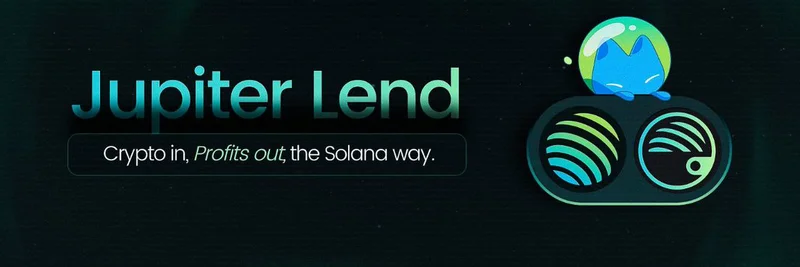Hey there, crypto enthusiasts! If you've been keeping an eye on the Solana ecosystem, you've probably heard the buzz around Jupiter Lend. This new lending protocol from the folks at Jupiter Exchange is making waves, racking up over $500 million in total value locked (TVL) in less than a week. That's no small feat in the fast-paced world of decentralized finance (DeFi). But what's got everyone so excited? Let's break it down, inspired by a insightful thread from @dearrkingsonn_ on X.
A Quick History of Jupiter Exchange
Jupiter started back in October 2021, thanks to the brilliant minds of @weremeow and @sssionggg. It's grown into the go-to decentralized exchange (DEX) liquidity aggregator on Solana, basically acting as your one-stop shop for the best token swaps. By pulling liquidity from places like Raydium, Orca, and Serum, Jupiter ensures you get top-notch prices, super low fees, and barely any slippage—that annoying price change that happens during big trades.
Over the years, Jupiter has rolled out cool features like portfolio tracking with @jup_portfolio, pro trading tools via @JupPro, and even a mobile app (@jup_mobile). Now, they've spotted some major headaches in DeFi lending and decided to fix them with Jupiter Lend (jup.ag/lend). Think of it as the ultimate upgrade for putting your crypto to work.
The Pain Points in Traditional DeFi Lending
DeFi lending sounds great on paper—you lend out your crypto and earn interest, or borrow against your holdings without selling. But in practice? It's got some serious issues that can scare off even seasoned users.
First up, high liquidation risk. Crypto prices swing wildly, and if your collateral dips too low, bam—your assets get sold off automatically to cover the loan. This often comes with hefty fees, turning a small market dip into a big loss.
Then there are those confusing vaults. Many promise sky-high annual percentage yields (APYs), but good luck figuring out where the returns come from. Risks like impermanent loss (when token values in a liquidity pool shift unevenly) or ties to other shaky platforms aren't always clear, leading to mistrust and headaches.
Don't get me started on complex and expensive fee structures. Between protocol fees, origination charges, liquidation penalties, and Solana's already low but still present gas costs, borrowers often end up paying way more than expected. This erodes trust in DeFi as a real alternative to traditional banking.
Finally, liquidity fragmentation is a killer. Your funds are scattered across lending platforms, DEXs, and yield farms, making everything inefficient—higher slippage, worse pricing, and limited options for borrowing or lending.
How Jupiter Lend Fixes These Issues
Jupiter Lend isn't just another lending protocol; it's designed to tackle these problems head-on, making DeFi lending safer, simpler, and more profitable on Solana.
To combat high liquidation risk, it uses an advanced liquidation engine from their partner @0xFluid. This allows for borrowing up to 90% loan-to-value (LTV) ratios—among the highest out there—while keeping liquidation penalties as low as 0.1%. That's up to 100 times lower than what you see elsewhere, giving you more breathing room during volatile markets.
Confusing vaults? Forget about them. Jupiter Lend offers "autopilot" Earn vaults where you can deploy assets with one click. No more juggling hundreds of positions manually; the system handles the optimization for you, making yield farming effortless and transparent.
On fees, the low liquidation penalties are a game-changer, and the overall structure keeps things cost-effective without hidden gotchas. Plus, being on Solana means transactions are lightning-fast and cheap.
Liquidity fragmentation gets solved by integrating everything into one unified system. Jupiter Lend combines lending, borrowing, and trading seamlessly, pulling from Jupiter's vast liquidity pools to ensure better pricing and efficiency.
Standout Features of Jupiter Lend
Here's what makes Jupiter Lend shine:
Earn Mode: Drop your assets into vaults for autopilot yields. It's perfect for passive income without the hassle.
Borrow Mode: Use isolated vaults for safer borrowing. Supports high LTVs and features like universal top-up, where you can add collateral or repay from any wallet via a simple link—great for managing multiple accounts.
Multiply Mode: Want to amp up your returns? Use flash-loan tech for one-click leverage looping, multiplying your exposure without extra steps.
It supports a bunch of assets, including wrapped Bitcoin variants, liquid staking tokens (LSTs) like JupSOL, stablecoins, Jupiter's liquidity provider token (JLP), and even JUP itself as collateral for borrowing USDC.
Security is top-notch too, with multiple audits done and more in the works, plus plans for open-sourcing the code and a bug bounty program.
And the incentives? Over $2 million from Jupiter, Fluid, and partners, kicking in right away for Earn and Borrow vaults. No wonder it hit $500M TVL so fast!
Why This Matters for Meme Token Fans on Solana
At Meme Insider, we're all about meme tokens, and Jupiter Lend fits right in. Solana's meme coin scene is exploding, but trading them often means needing quick liquidity without selling your favorites. With Jupiter Lend, you can borrow against your holdings—like using JUP or other tokens as collateral—to dive into the next hot meme without liquidating your portfolio.
Plus, the high LTVs and low risks make it easier to leverage positions in volatile meme markets. Imagine borrowing stablecoins to buy into a pumping token, then repaying once it moons—all while earning yields on your lent assets. It's a tool that empowers meme traders to stay agile and maximize profits in this wild ecosystem.
If you're into Solana memes, keeping an eye on how protocols like Jupiter Lend evolve could give you an edge. Check out the original thread for more insights, and head over to jup.ag/lend to try it yourself.
Jupiter Lend is proving that DeFi on Solana can be user-friendly, secure, and highly rewarding. As the ecosystem grows, expect even more innovations that blend seamlessly with the meme token craze. Stay tuned!



